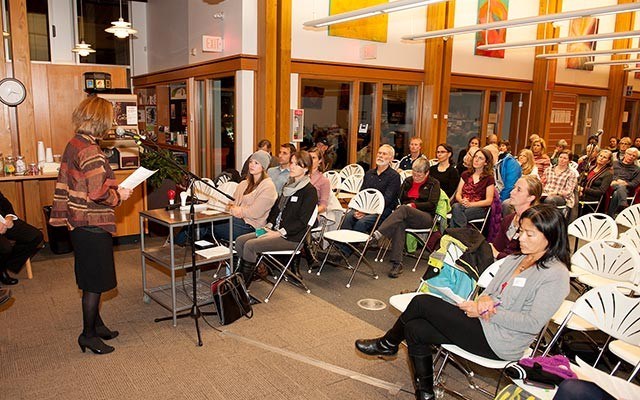With just two weeks to go before residents head to the polls, the campaign trail has been mostly quiet in Whistler, especially compared to the last municipal election, which saw a 54 per cent voter turnout and a complete ouster at the council table.
So Tuesday's All-Candidates Meeting — one of three scheduled before election day — offered the 115 in attendance the first real glimpse at the full slate of candidates, and kicked a sleepy campaign into gear.
Co-hosted by the Association of Whistler Area Residents for the Environment (AWARE) and the Whistler Centre for Sustainability, the debate focused primarily on environmental and sustainability issues, but also afforded the two mayoral and nine council candidates the chance to outline their platforms.
The tone was noticeably conciliatory throughout, with the majority of candidates commending Whistler's current mayor and council for a productive term.
A poised Mayor Nancy Wilhelm-Morden began her introductory speech by highlighting some of the major achievements her council was responsible for, including three straight years of holding the line on property taxes; record-breaking visitation numbers bolstered by several new big-ticket events and the completion of various major reports.
Her fellow council members mostly stuck to their respective areas of expertise, with John Grills discussing waste reduction efforts, like extending yard waste drop-off to more than twice a year; Andrée Janyk pushing for continued improvements to the Valley Trail network and Jack Crompton focusing on increasing public transit ridership, "the key" to managing the impacts of climate change over the next term.
"The ridership in Whistler is incredibly high, so to move the dial we have to have everyone at the table and in agreement that this is a viable goal moving forward," he said.
Transportation was on the minds of several candidates at Tuesday's meeting, with Steve Anderson calling for a more "seamless transition between local and regional transit," something that was echoed by Jen Ford, who would like to see better transportation options for visitors travelling from the Vancouver airport.
Realtor Michael d'Artois, meanwhile, promised to lobby the provincial government to return the Sea to Sky Highway to three lanes from Creekside to Function.
If there was one candidate who went against the grain in his messaging, however, it was most certainly Shane Bennett, who is bidding for mayor, as he does every election, and drew scoffs from the crowd when speaking on various points that fell outside of municipal purview, like Canada's "corrupt" banking system and repressed alien technologies.
Peter Crutchfield pointed to fiscal responsibility as "the bedrock" to achieving sustainability goals, because "all these (green) projects are great, but if the government can't pay for them, they're not going anywhere." The first-time candidate showed his lack of experience in certain areas, however, occasionally blanking on specific questions — a problem that also plagued several other candidates.
Entrepreneur Tristan Galbraith, for example, delivered a prepared response urging the resort to look at Whistler's early pioneers for an example of effective sustainable living, but declined to answer when asked how to balance the needs of motorized and non-motorized recreational users in the community.
"It's too big of a question to answer right now," he said.
Candidates were also stumped when asked how to affordably house Whistler's growing pool of seasonal workers, an admittedly complex issue that has plagued the resort for years.
"I have no idea what the answer is, but I'm committed to finding it, and it's going to require working with (resort stakeholders)," d'Artois said, before continuing.
Another audience member continued the line of questioning, worried that the candidates haven't done enough to show their support for Whistler's seasonal workforce.
"Certainly there are challenges to being a seasonal worker..." said Wilhelm-Morden. "Please erase that impression from your mind that we don't value seasonal workers, we do."
Attendee Andrew Sainsbury wasn't buying it.
"The comment about how we care about seasonal workers, on a community scale we might, but at an economic level we don't," he noted, saying it's unacceptable that some of Whistler's transient workforce has to live at or near the poverty line.
The Whistler2020 planning document, which outlines the community's vision towards a sustainable future, was another recurring theme of the evening, with both Janyk and Sue Maxwell stressing the need to update the document.
With her experience in waste management, Maxwell spoke confidently on environmental matters, impressing at least one attendee who was otherwise nonplussed by candidates' views on sustainability.
"Everyone was safe, no one said anything other than, 'let's change some light bulbs,'" said River, who declined to use his last name.
Ford had a strong outing, demonstrating knowledge of municipal matters and reiterating her family-based platform.
The next All-Candidates meeting is tonight at Millennium Place (7 p.m. to 9 p.m.) with another scheduled for Nov. 3 at the Whistler Secondary School from 6:30 to 9:30 p.m.
Election day is Nov. 15.




